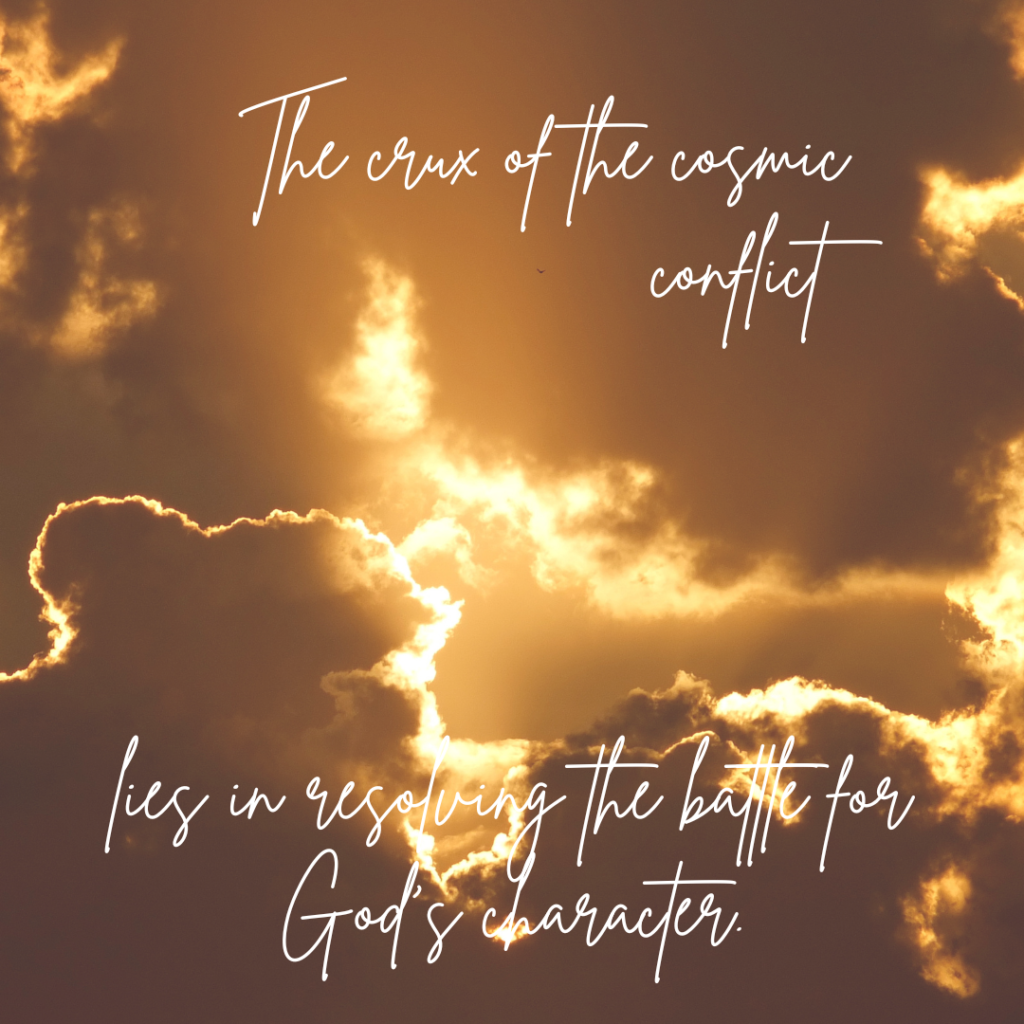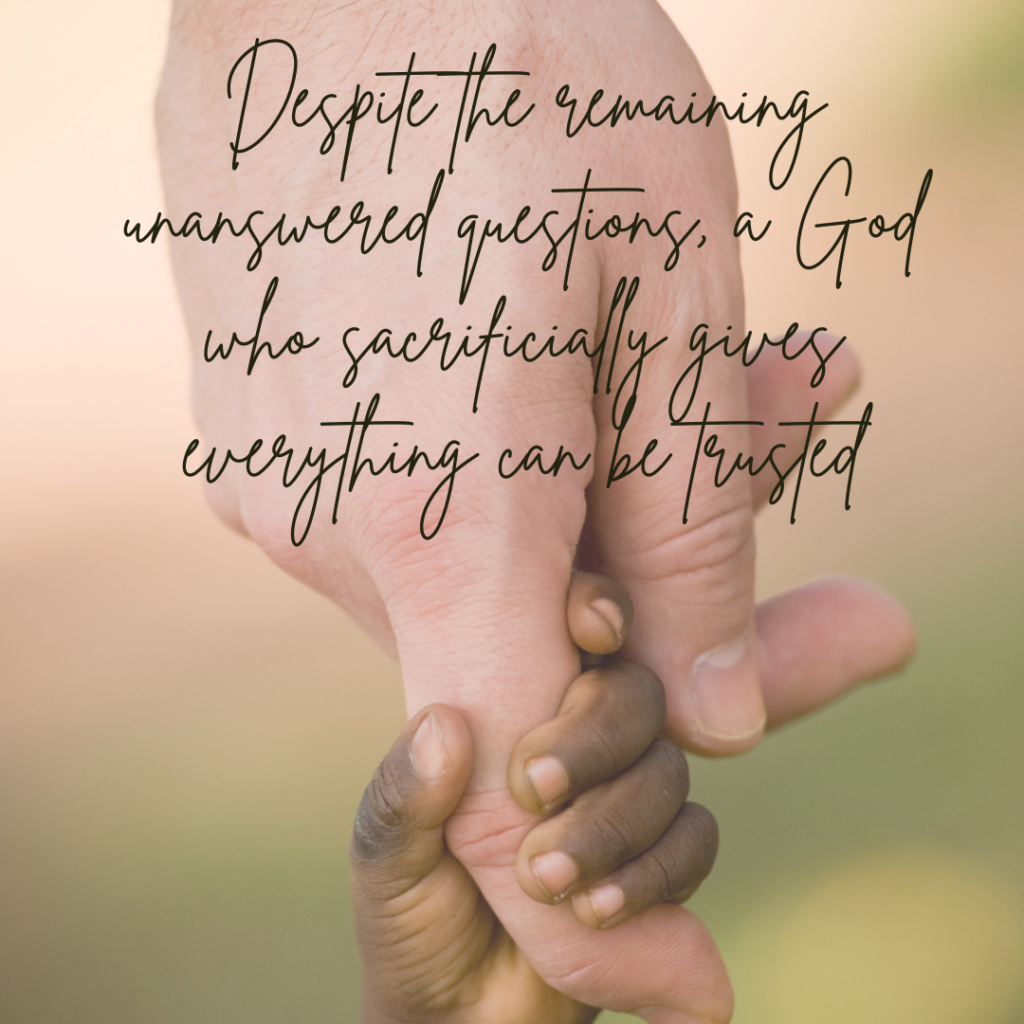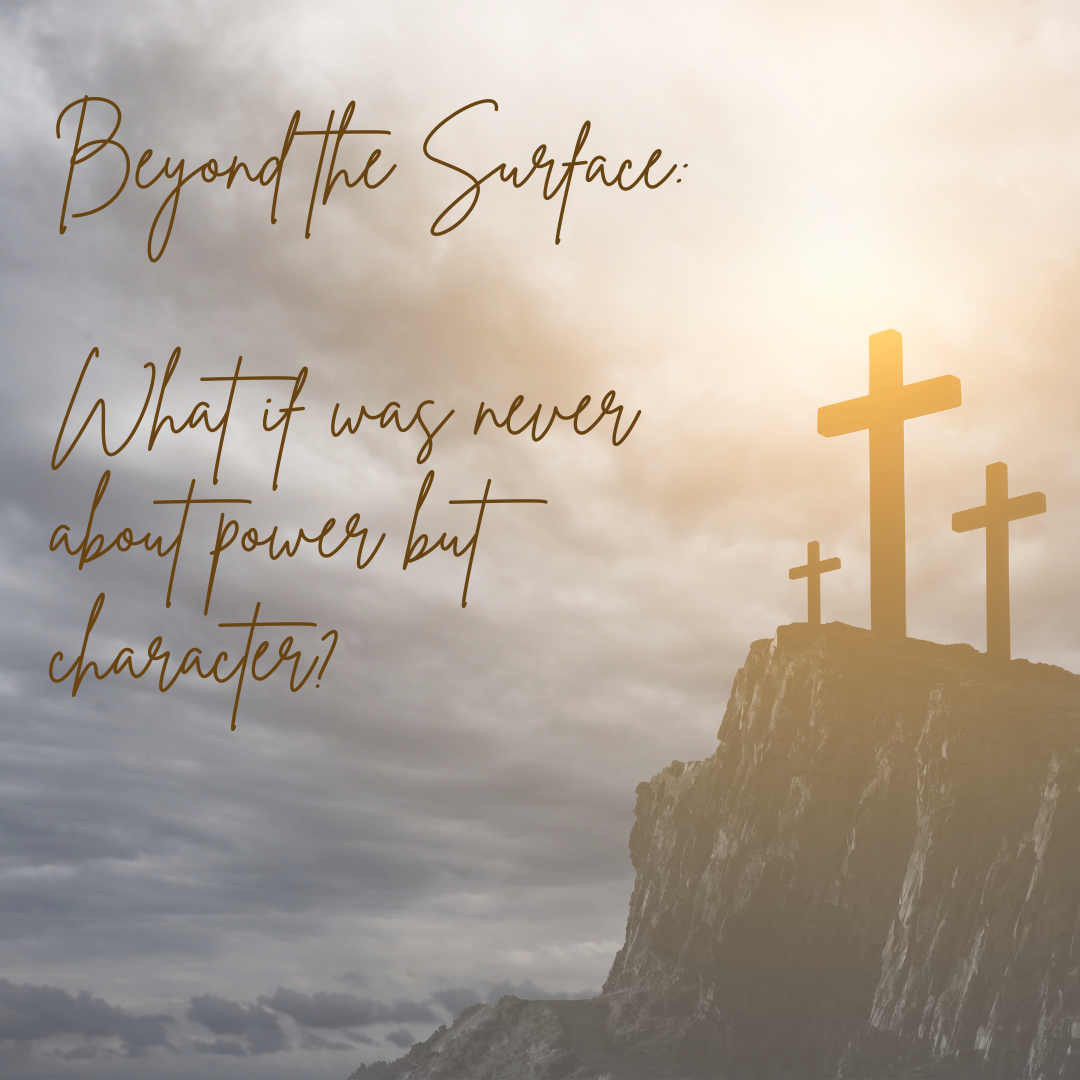Welcome back to the next installment of our cortisol control series! In the previous posts, we explored the Mystery argument and the Free Will argument to work on lowering sources of stress we might have spiritually. Today, we delve into another intriguing concept known as the Cosmic Conflict argument.
I’m pretty sure you have considered that there is more to our world and the problems in it than meets the eye. The Cosmic Conflict theory suggests that there is an ongoing struggle between good and evil not only in our world but also in other dimensions beyond our comprehension. This concept, sometimes referred to as the Great Controversy, sheds light on the lingering questions we often encounter when grappling with the goodness of God. While our limited understanding and free will play a significant role, this third explanation takes it a little deeper.
In my personal exploration of this topic, I stumbled upon a thought-provoking book called “Theodicy of Love” by John C. Peckham. It provides a comprehensive and insightful examination of this theory, delving into individual passages for further study.
The cosmic conflict explanation tackles the perplexing issue of why things like natural disasters and diseases occur, even when they are not directly tied to human free will. Many people find themselves stumbling over this particular aspect when grappling with the goodness of God. Surprisingly, I came across this explanation relatively late in my life, and I suspect many others may not have encountered it either. It truly fascinated me, and I hope it does the same for you. If you have already encountered this concept, I would love to hear your story! Feel free to share your thoughts and insights.
The concept behind this thought revolves around the battle for God’s character, the fundamental essence of who He is. Since the Garden of Eden, the enemy has been slandering God’s character, questioning His goodness, justice, and love. The snake claimed that God is a liar who deceives and oppresses His creation, attempting to prevent them from attaining their full potential. This assault on God’s character began in heaven and continues on Earth.
We have already explored why free will is necessary in our last post, and this same free will is necessary when choosing what we believe about God’s character. The cosmic conflict hinges upon the battle for what people will believe about God and who they will align themselves with.

The idea is that two opposing parties, the enemy and God both want us. Kind of like in stories where we sometimes witness manipulative tactics employed by one party to gain the character’s love by fulfilling their every desire, while the other party, who implements healthy boundaries, is viewed as unloving. This dynamic closely resembles the conflict between God, humanity, and Satan. While Satan accuses God of “buying” Job’s love through protection, he himself manipulates and deceives to gain allegiance.
The crux of the cosmic conflict lies in resolving the battle for God’s character. Since love cannot be forced, character cannot be mandated, and loyalty cannot be coerced, the conflict cannot be settled through sheer power. Instead, it requires a demonstration of character.
To illustrate this point, let’s consider the example of a mayor accused of massive corruption. If the mayor responds to these allegations by launching a smear campaign, bribing individuals, and intimidating those with possible, supposed evidence, would that make you believe in his innocence? Most likely, such actions would only confirm the allegations and make them more believable. The only way to regain trust and refute the allegations is by demonstrating unwavering character and integrity. In God’s case, this demonstration is not for his own defense because he needs no defense. It is for the purpose of establishing genuine love relationships that are so solid that evil allegations hold no ground due to unwavering trust.
In the cosmic conflict between God and Satan, it is suggested that the attack on God’s goodness, justice, and authority cannot be resolved through a mere show of power. The accusers are not silenced by overpowering them; rather, they are defeated through a demonstration of God’s love. This conflict requires certain rules of engagement or parameters within which both God and Satan operate. Just as a fair trial requires allowing the accuser to present their case, God allows Satan to work within certain limits. These parameters are set in the heavenly council, where other celestial beings are involved. Satan brings his allegations before this court, as mentioned in the book of Job.
It seems to me that if everything happened exactly as God desired, history would be a straightforward line without any evil or suffering. However, due to the choices made by creatures like us, the world is filled with chaos and brokenness. Yet, God works within the framework of these choices, just as he did when Adam and Eve made the original sinful decision. Jesus’ redemptive work was God’s way of providing a solution and preventing the consequences from becoming final. Sometimes, we may perceive God’s actions as unkind or harsh, but his motivations are ultimately for our protection and to avoid greater harm.

If you’ve ever watched a cooking competition, maybe this can help bring some clarity to what this might be like. Contestants must incorporate certain ingredients while having the freedom to use others. If God were a contestant, we would understand that not everything in his kitchen was brought by him. Instead, he combines his actions with the given factors to bring about the best possible outcome. This is not God’s ideal will, but his remedial will. Creatures do suffer greatly due to evil, but God suffers even more by providing the definitive demonstration of his justice and love. Despite the remaining unanswered questions, a God who sacrificially gives everything can be trusted.
The story of Job offers some insights into how this complex situation unfolds. Job, a righteous man, undergoes immense suffering, and he questions God because he does not understand the larger factors at play. God’s response, though challenging, reveals that there are broader considerations beyond Job’s comprehension. As we embrace the concept of God working with what we offer him and bringing about the best possible outcome within the constraints of free will and his commitments, we can begin to grasp the complexity of the cosmic conflict.
When I don’t understand a situation, here are some questions I gently ask myself now: Do I know what God knows in that situation? Do I know what avenues are available to Him that will not compromise His character and ultimate plan for all, and what would have been better?
Sometimes, we might think that “Plan A” would be better than “Plan B,” but would “Plan A” still be better if it undermined God’s character? This is a challenging concept, especially for those of us who have been taught that God can do whatever He wants and that everything that happens is caused by Him. But that is a one-dimensional, black-and-white view of God.
God is both all-powerful AND chooses not to use that power to violate our free will. It’s not just a two-dimensional perspective; there are at least three dimensions at play. Our free will, God’s desires, and the dimension of other spiritual powers mentioned in Ephesians 6 that are working against God, which we know very little about. These factors complicate finding non-compromising solutions even further.
When we look at something happening, we often wonder if doing something different would be better than what actually happened. But we must recognize that in most cases, God isn’t the one causing what is happening. It is the result of someone else’s free decision, whether human or a spiritual force. For God to intervene might have resulted in greater evil down the road or violated someone else’s free will or undermined love itself.
The Bible provides us with examples of situations where God is working with certain impediments. For instance, several women being barren for a time could have been fixed instantly by God, or the Israelites could have been led in a straight line to the promised land instead of spending 40 years in the desert. Joseph could have been spared from being sold into Egypt and the subsequent famine. Jonah could have been prevented from boarding the ship that took him in a round about way to Nineveh. But unless God had other impediments that we don’t know about, there would have been simple solutions for these issues. The fact that God chooses to solve them in a roundabout way could indicate that He is working with the bad decisions of others.
Even the prophets in the Bible questioned why God allowed certain things to happen and why it took so long for Him to act. We see examples like Israel waiting in Egypt for a long time before God acted, or Abraham being told about the future enslavement of his descendants. These stories leave us wondering why, but they also remind us that there are other factors at play beyond our understanding.
Just like an astronomer can see a black hole based on what is happening around it, not based on seeing the hole itself, we can see, based on the way God is working, that there are other factors at play. In some cases, we know the factors, such as in Daniel 10, where the delay was because of the “prince of Persia.” But in other cases, we don’t have all the information. For example, when God told Moses to leave Him alone so He could destroy the people, we know that God didn’t want to destroy them. Could it be that God wanted someone to intercede for the people because the rules of engagement required it? Could there have been other impediments He had to work around? We don’t have all the answers, but these stories teach us humility in recognizing our considerable ignorance.
One biblical example that brings validation to many of us is the story of John the Baptist. He was doing his best to serve God and ended up suffering and questioning. This resonates with us because we have also experienced or witnessed injustice in our lives. We long for resolution and a better world, and thankfully, there will be one. Even the prophets cried out for justice, and God Himself cried out for the orphans, widows, and the poor and oppressed. We ask why He doesn’t stop it immediately, and it’s a valid question. It’s hard to accept that the answer is “eventually” they will be judged.

In the face of disappointments and injustices, it’s natural to feel impacted and long for a better world. But even with our high sense of justice, apart from a good God, we might resign ourselves to apathy because it seems like evil and disappointments won’t stop. We may feel powerless to do much about it. However, we can find solace in the fact that there will be a day of judgment, and ultimately, justice will prevail.
So, as we navigate the complexities of life and encounter situations that seem perplexing, let’s remember to approach them with humility, recognizing our limited perspective. Let’s trust that God, in His infinite wisdom, is working within the constraints of our free will, other spiritual powers, and His own character. Though we may not always understand His ways, we can find comfort in knowing that He is always working towards His ultimate plan for redemption and restoration.
Wow, what a journey it has been exploring the goodness of God and this third argument, the Cosmic Conflict. I initially thought I could wrap it up in just four posts, but it turns out that the concept of “rules of engagement” introduced in this third argument, felt both new and foreign to me. I had to dive deeper for myself and don’t want to leave you hanging in case you are wanting to hear more on that idea as well. Since this topic is still relatively fresh for me, I haven’t come across many other perspectives on it. I want to emphasize that I’m presenting these ideas as a jumping board for further exploration. I genuinely value your thoughts and would love to hear what parts of this journey resonate with you, what leaves you with questions, and everything in between.
I hope you’ll join me for the last post before we embark on a new adventure of exploring how we can reduce stress on a soul level. See you there!
P.S. Remember, I provide additional journaling questions related to this post in my private FB group. You are warmly invited to join for a deeper dive!








Oh Cendrine!!!!! So many various points you elucidated on had me speaking in TONGUES is was so GOOD!!!! Statements such as these resonated with me:
“In God’s case, this demonstration is not for his own defense because he needs no defense. It is for the purpose of establishing genuine love relationships that are so solid that evil allegations hold no ground due to unwavering trust.”
” The accusers are not silenced by overpowering them; rather, they are defeated through a demonstration of God’s love.”
” Despite the remaining unanswered questions, a God who sacrificially gives everything can be trusted.”
” The fact that God chooses to solve them in a roundabout way could indicate that He is working with the bad decisions of others.”
” Though we may not always understand His ways, we can find comfort in knowing that He is always working towards His ultimate plan for redemption and restoration.”
Thank you so much for this! I am so blessed to have you in my life Sister, HOLY FEAR of the LORD you bring, and this FRESH BREAD is delicious, Hallelujah!